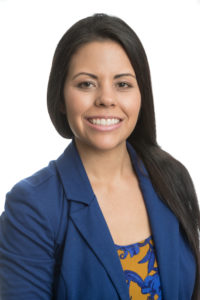The Association for Counselor Education and Supervision recently presented the ACES Research in Counselor Education and Supervision Award to a research team including Jessica Gonzalez, an assistant professor in the School of Education’s Counseling and Career Development specialization at Colorado State University, and three co-authors for their research publication titled, “Investigating Supervisory Relationships and Therapeutic Alliances Using Structural Equation Modeling.”
Studying supervisor-student and student-client relationships
 The research team included University of Florida Assistant Professor Kristina DePue (the article’s lead author), University of Central Florida Professor Glenn Lambie, University of Florida doctoral student Ren Liu, and Gonzalez. Gonzalez’s primary contribution was in collecting data from a university-based community counseling and research center housed within the university’s counselor education program. Here, the program’s counselors-in-training fulfill practicum requirements by providing free counseling services to the public while being supervised by licensed clinical counselors.
The research team included University of Florida Assistant Professor Kristina DePue (the article’s lead author), University of Central Florida Professor Glenn Lambie, University of Florida doctoral student Ren Liu, and Gonzalez. Gonzalez’s primary contribution was in collecting data from a university-based community counseling and research center housed within the university’s counselor education program. Here, the program’s counselors-in-training fulfill practicum requirements by providing free counseling services to the public while being supervised by licensed clinical counselors.
The research addressed issues around the education and supervision of counselors, focusing on the relationships between counselors-in-training and their clinical supervisors, and between the counselors-in-training and their clients.
“In the counseling field, there’s not a lot of research on the client’s perspective, or what happens in supervision,” says Gonzalez. “This study is different in that we got the supervisor’s view of the therapeutic relationship, the client’s perspective, and the counselor’s perspective. We found that there were differing views in the client and counselor perspectives about the therapeutic alliance, so there’s more research needed to see why clients and counselors view things differently.”
The team gathered data from 110 counselor-client dyads and from clinical supervisors through completion of two assessments: the Supervisory Working Alliance-Trainee Form and the Working Alliance Inventory. The forms, says Gonzalez, have a lot of counselor language, which might have influenced how clients reported their perspectives on client-counselor relationships.
“There might need to be an assessment tailored more to client language,” Gonzalez remarks.
Value of strong supervisory relationships
“The research focuses on the bond, the relationship between supervisors and counselors-in-training, and how that affects the relationship between the counselor and the client,” explains Gonzalez.
The research team found that a strong supervisory relationship is helpful as counselors-in-training learn how to understand and develop a therapeutic alliance with their clients, demonstrating the value of a supportive supervisory relationship in which the supervisor models safe, healthy, and professional relationships for those whom they supervise.
The research is the first of its kind, contributing to the supervision terminology already present by offering evidence-based results, using rigorous statistical analysis, that emphasize the importance of a strong supervisory relationship in counselor training.
Future implications and research
Because the research project’s findings parallel her research with individuals with health disparities and their caregivers, Gonzalez is replicating the process at CSU, gathering data through client outcome assessments and supervision styles.
“I research health disparities such as breast cancer, and within those types of interventions, you need to supervise the counselors giving those interventions,” says Gonzalez. “Since we found the importance of the supervisory relationship on the counseling relationship, I’m seeing the importance for me to model that relationship when I’m supervising students who are working with breast cancer survivors and other clients.”
She has incorporated multicultural competency—a counselor’s ability to have the knowledge, self-awareness, and skills necessary to help clients feel at ease in discussing areas of their identified culture—to her research, asking clients whether talking about their identified culture in the counseling session is important to them.
Adding multicultural competency, says Gonzalez, is the natural progression of the studies the team has already conducted, and will give counselors the skills and understanding to work with a variety of populations in a counseling session. While the importance of multicultural competency is emphasized in counselor education, Gonzalez notes the lack of research measuring client and counselor perceptions on multicultural competency, the therapeutic relationship, and client outcomes.
“In our field, we say multicultural competency is important, the therapeutic relationship is important, yet there’s not a lot of data to back that up,” says Gonzalez. “So one of the things I’m doing is looking at the working alliance/therapeutic relationship and multicultural competency from both client and counselor perspectives.”
The School of Education is part of the College of Health and Human Sciences.